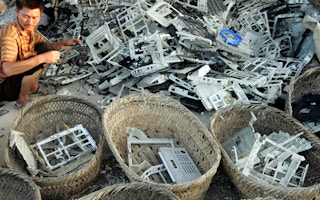Asia Pacific is producing more than half of global electronic waste or e-waste, yet worldwide, only 10 per cent of it is recycled. The region needs tighter regulation in this area yet its implementation is tricky to execute, said experts at a recent industry roundtable.
Speaking at a recent roundtable on e-waste organized by printing giant Fuji Xerox in Pattaya, Thailand last week, Dr. Park Young-Woo from the United Nations Environment Programme (UNEP), said that e-waste is a problem, since it is growing 40 per cent each year.
E-waste - which refers to electronic goods that are used and no longer wanted such as computers, laptops, smart phones, printers and washing machines - now make up five per cent of all solid waste worldwide.
E-waste recycling ranks low in priority for many countries, and other obstacles include lack of collection infrastructure and lack of responsibility on discarded items from the private sector, especially information technology (IT) firms which manufacture the products.
If not properly disposed, e-waste can pose hazards to the environment and human health. These items contain toxic chemicals such as lead, mercury, cadmium and flame retardants, which can leak into the environment. Handling of such unsafe items by humans can also lead to cancer, developmental defects and other health problems.
UNEP’s programme officer, Mr. Mushtaq Memon, who also spoke at the event, said that one of the crucial concerns was this gap between regulations and its implementation.
Without sufficient research and development (R&D), financing, capacity-building and knowledge-transfer, the implementation of regulations would be difficult, he said. As such, regulations alone would not solve the problems of e-waste.
Panelists agreed that the solution to e-waste lay in ‘producer responsibility’ - companies, as part of their corporate social responsibility (CSR) efforts, need to oversee the life-cycle of their products and should design products that are more re-useable and renewable.
Associate Professor Chris Ryan from the Melbourne Institute of Applied Economic and Social Research recommended companies to follow guidelines set by UNEP in their ‘design for environment’ guide.
Attention to the design of a product could reduce its environmental impact by as much as 60 to 80 per cent, he pointed out.
Dr. Patsaraporn from Thailand’s Department of Industrial Waste reiterated that education of youths and the next generation is needed so that sufficient pressure is put on companies to be responsible, and greener technologies can be adopted.
This way, eco-friendly behaviour can be ingrained and people are more likely to consider recycle their products responsibly.
Associate Professor Chris Ryan said at the roundtable that Fuji Xerox’s efforts on recycling is timely, as “the era of pure production of goods and economic growth has passed”.
With increasing pollution and toxic waste, the focus in the next two decades will be on the recovery of materials and components, he said.
Dr. Park said Fuji Xerox has been a pioneer in the industry in e-waste recycling. Since 1995, it has channeled its CSR efforts into the development of a sophisticated integrated recycling system.
This system is unique in that it uses a process called ‘signature analysis’ to determine the condition and age of the parts of the used product, before the parts are re-used in the manufacturing of new products.
Another issue raised was the relationship between the consumers, shareholders, governments and companies.
Amanda Keogh, head of sustainability at Fuji Xerox Asia Pacific, highlighted that it was essential to build trust between consumers and companies.
She said that in order to alleviate suspicions of greenwashing, or the phenomenon of companies deceptively promoting themselves as environmentally-friendly in order to win over consumers, governments must look into ways to accreditate the CSR efforts of businesses.
Panelists agreed that e-waste will be a pressing issue for businesses, governments and consumers in the coming decades.
“Recovering precious metals from used parts can not only reduce environmental damage, it also has economic benefits and even health benefits. This is why we must take the issue of e-waste seriously”, said Dr. Park.

















